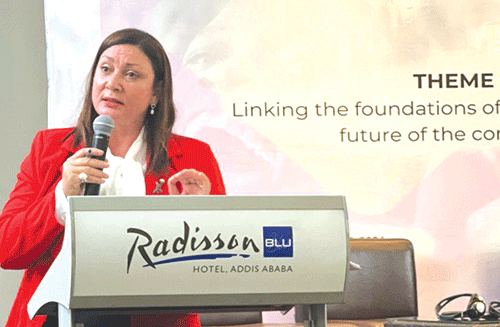Due to limited investments in pre-primary education, only 55.1% of children receive one year of pre-primary education (PPE), leading to nearly four in 10 children entering grade 1 without adequate school readiness.
Education executive director Sanet Steenkamp revealed this in her presentation during a Human Capital African pre-AU Summit roundtable discussion as part of the 37th African Union Summit underway in Addis Ababa, Ethiopia on Monday.
She noted that the education sector has continued to receive the highest national budget allocation at above 20% of the total budget and 8% of GDP, respectively, which is well-aligned with the Dakar threshold by African governments, and commendably high by international standards.
“Despite high allocations in education, spending has remained skewed towards operational expenditures, impacting on quality and equitable access. Over the five years to 2022/23, spending on salaries averaged 80.3%, compared to teaching and learning materials (13.2%), and infrastructure (3.5%),” Steenkamp highlighted.
She indicated that the limited investment, especially in pre-primary education, has dire consequences, saying, “This contributes to high repetition rates in grade 1 (17.3%), grade 4 (18.3%), and grade 5 (17.0%), along with low retention and performance rates”.
Pre-primary education, equalling one year of formal education before primary level, was introduced in Namibia in 2009.
Steenkamp said the cumulative impact of repetition and dropout rates result in a significant loss of investment, potentially irreversible in terms of education outcomes, human capital development, learners’ future earnings, and efforts to reduce unemployment and poverty levels.
“This early childhood period offers a critical window of opportunity to invest in shaping the trajectory of a child’s holistic development and build a foundation for their future,” she stated.
The executive director said most of the Namibian population demanded that government focuses on investing in early learning as the foundation for lifelong learning, with a focus on vulnerable and marginalised communities.
“We are reforming our school funding system to be more equitable. Under this endeavour, Cabinet approved, in June 2023, the School Grant Policy to reduce existing inequities through an efficient and equitable funding mechanism that ensures that schools and their learners from different socio-economic backgrounds access adequate resources,” she observed.
Steenkamp added that these resources are required for pupils to participate fully in education, irrespective of their past historical, material or social-economic disparities, or level of social marginalisation.
To address this, her ministry intends to readjust the funding formula to strategically prioritise pre-primary education, and progressively achieve the 10% spending target for PPE.
“This will help address the current infrastructure gaps, as well as shortages in relevant learning materials and teachers, as well as their professional development,” said Steenkamp.
Additionally, the ministry will reform the school grant policy to prioritise the regions with the greatest needs and learners with disabilities and other special needs in education, and strengthen the link between early childhood development and pre-primary education through the development of a robust National Strategy for Foundational Learning.
“Improving access to internet connectivity and digital technologies in schools, including at foundational level, is crucial. In doing so, we will ensure that the digital learning solutions and approaches are more equitable, accessible and inclusive for children with disabilities by ensuring they run effectively offline, or with limited connectivity and on low-cost devices, including the use of local languages,” she noted.
Achieving the above means there is a need for all stakeholders, including the private sector, to work together, and invest more and better. – psiririka@nepc.com.na



